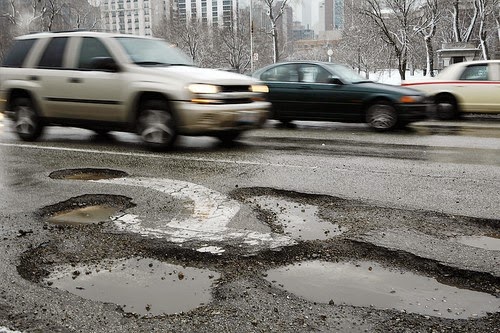Macomb County’s potholes are so big that they’re big news.
The county’s crumbling roads were featured in a news story published this past week by the Chicago Tribune, the Los Angeles Times and other papers across the nation.
The article focuses on the massive Mound Road potholes but it also mentioned other infrastructure disasters such as the Fraser sinkhole and the dozens of annual beach closings due to sewage in Lake St. Clair.
A local defense contractor quoted in the article said he worries about the impact barely passable roads are having on his plant, located along the Mound Road corridor.
“Then begins a tour full of swerves, bumps and sudden stops,” wrote Chicago Tribune reporter Noah Bierman. “Asphalt crews are everywhere, spreading temporary fill into holes as fast as they can in a sort of never-ending whack-a-mole game. (Factory owner Mike) Brzoska points out the old ‘rebar’ jutting from the crumbling roadway and the cracks between holes that lead to other cracks.
“’What do you do with this?’” he says at a familiar ditch. “’This has been patched two weeks ago.’”
Another temporary fix
President Trump’s proposed infrastructure improvement plan probably won’t offer much help to fix this mess and County Executive Mark Hackel warns that a partial repair of Mound’s eight lanes, scheduled for this summer at a cost of nearly $12 million, represents only a stopgap measure. Those repairs may only last a few years.
Hackel told Crain’s Detroit Business over the weekend that rebuilding Mound from Eight Mile Road in Warren to Hall Road in Sterling Heights — a $25 million per-mile proposition — would eat up the county’s entire road budget for four years.
At a gathering of government and community leaders this morning, Hackel offered this bit of startling news: The county suffers from 805 miles of road lanes, plus 44 bridges, in poor condition and the price tag to repair it all stands at more than $1 billion.
How daunting is that? Consider this: If the auto fee increases and gas tax hikes that took effect last year to repair Michigan roads were funneled to Macomb, it would take nearly two years to fund all the county’s needs and the Legislature would have no new money left for the roads and freeways in Michigan’s other 82 counties.

For example, Hackel unveiled a new interactive map, now available on the county website, that pinpoints the location of each trouble spot. Barely any of those targeted county roads and bridges are located in the southern tier of Macomb, between Eight Mile and 14 Mile.
That densely populated territory is mostly the responsibility of cities like Warren, Roseville, Eastpointe and St. Clair Shores that struggle each year to maintain a balanced budget.
A 25-pound chunk of concrete dislodged from the road
Meanwhile, Chad Livengood, a reporter for Crain’s, was taking photos of the Mound Road pothole debris a few days ago and he came across a 25-pound piece of concrete lying in the median near 15 Mile.
“The reason I was out on Mound Road photographing chunks of concrete is it’s actually one of the most economically important roads in the state. And yet, we’ve let it go to hell,” Livengood posted on Twitter.
An auto industry executive, Glenn Stevens, chimed in:
“Drove down Mound last Tuesday a.m. after visiting the grand opening of a new auto supplier tech (center) in Warren. Inside the facility was world class industry 4.0, a big part of Michigan’s future. What I experienced on Mound Road was 3rd world. Literally had a headache from it.”
Three years ago, the Legislature passed a road funding package that satisfied nearly no one. Beginning in 2017, the new law raised vehicle registration fees by 20 percent, the gas tax by 7.3 cents per gallon and the diesel tax by 11.3 cents. Those increases generate roughly $600 million in new annual revenue. In addition, lawmakers will gradually shift $600 million a year from the general fund budget to road projects. The overall boost will reach $1.2 billion by 2021.
When the scope of this year’s disastrous pothole season became apparent in February, the Legislature pitched in another $175 million, a 7 percent increase.
Yet, an infrastructure commission appointed by the governor said the 2015 package “would not be enough to revive and sustain the condition of Michigan’s roads, bridges, and transit over the long term, let alone prepare Michigan for the 21st century.” The report called for an additional $2.2 billion each year.
While lawmakers want motorists to believe they have put the pedal to the metal to fix the roads, the director of the Michigan Department of Transportation (MDOT) said in a November interview that the state is actually losing ground as the 2015 plan is phased in.
“It means we’re slowing the rate of deterioration,” said MDOT’s Kirk Steudle. “The projections still show that we aren’t turning the curve around, (the roads) are still going to degrade, they’re still going to continue to get worse. Just not as fast.”











